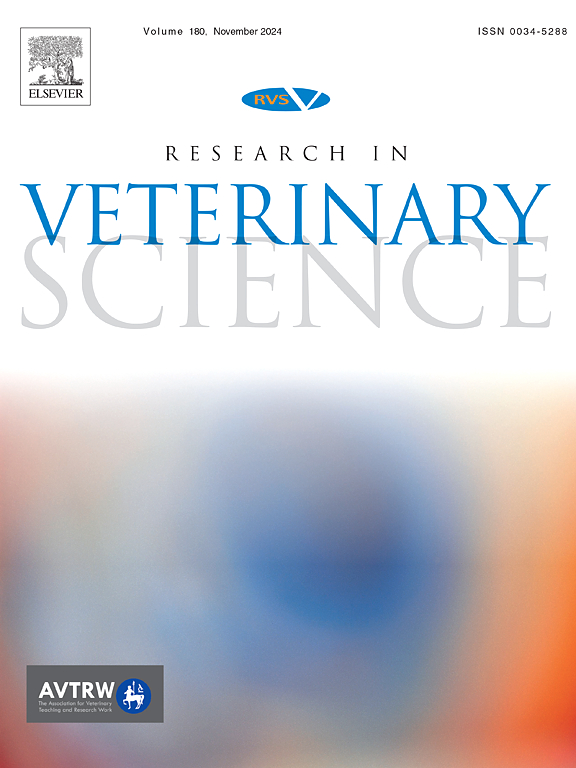MHC相容性影响不同类型马间充质干细胞/基质细胞之间的相互作用和局部免疫反应
IF 1.8
3区 农林科学
Q1 VETERINARY SCIENCES
引用次数: 0
摘要
同种异体给药马间充质干细胞/基质细胞(MSCs)比自体治疗有许多优点,但它们与患者免疫系统的相互作用需要进一步阐明。这些相互作用可能受到主要组织相容性复合体(MHC)的供体-受体之间的相容性和MHC表达水平等因素的影响,MHC表达水平可以在炎症暴露和软骨分化等不同条件下发生变化。在这项研究中,我们评估了软骨分化(MSC-chondro)、促炎启动(MSC-primed)和基础(MSC-naïve)间充质干细胞诱导的局部免疫反应,以及这种反应如何改变体内间充质干细胞的免疫调节和免疫原性特征。将马间充质干细胞包埋在海藻酸盐支架中,皮下植入自体、mhc匹配和mhc不匹配的马。在不同的时间点回收支架进行组织学和基因表达分析,并重复该过程以评估第二次给药的效果。我们的研究结果提示mhc相容性可能在减弱MSCs诱导的局部免疫反应中发挥关键作用,这可能与体内三种MSC中免疫调节基因的上调有关。相比之下,当MSCs被给予mhc错配的马时,免疫原性基因的表达在所有MSC条件下都更高。因此,给予间充质干细胞的条件可能不会影响长期的局部免疫反应,但mhc匹配的政府将有利于间充质干细胞的免疫逃避,因此尤其在需要重复给予间充质干细胞时是可取的。全面研究马同种异体间充质干细胞的体内免疫反应对推进兽医细胞治疗至关重要。本文章由计算机程序翻译,如有差异,请以英文原文为准。
MHC compatibility influences the interaction between different types of equine mesenchymal stem/stromal cells and the local immune response
The allogeneic administration of equine mesenchymal stem/stromal cells (MSCs) has numerous advantages over autologous therapy, but their interactions with the patient's immune system need to be further elucidated. These interactions can be influenced by factors such as the compatibility between donor-receptor for the major histocompatibility complex (MHC) and by the MHC expression levels, which can change under different conditions like inflammatory exposure and chondrogeneic differentiation. In this study, we evaluated the local immune response induced by chondrogeneically differentiated (MSC-chondro), pro-inflammatory primed (MSC-primed) and basal (MSC-naïve) MSCs, and how this response changes the immunomodulatory and immunogenic profiles of MSCs in vivo. Equine MSCs were embedded in alginate scaffolds and subcutaneously implanted into autologous, MHC-matched and MHC-mismatched horses. Scaffolds were recovered at different time-points for histologic and gene expression analyses, and the procedure was repeated to assess the effect of a second administration. Our results suggest that MHC-compatibility may play a key role in attenuating the local immune response induced by MSCs, which may be related to the upregulation of immunomodulatory genes in the three MSC types in vivo. In contrast, when MSCs were administered into MHC-mismatched horses, expression of immunogenic genes was higher across all MSC conditions. Therefore, the conditions in which MSCs are administered may not affect the long-term local immune response, but MHC-matched administration would favour the immune evasion of MSCs, thus being advisable especially when repeated MSC administrations are required. Comprehensively investigating the in vivo immune response against equine allogeneic MSCs is crucial for advancing veterinary cell therapies.
求助全文
通过发布文献求助,成功后即可免费获取论文全文。
去求助
来源期刊

Research in veterinary science
农林科学-兽医学
CiteScore
4.40
自引率
4.20%
发文量
312
审稿时长
75 days
期刊介绍:
Research in Veterinary Science is an International multi-disciplinary journal publishing original articles, reviews and short communications of a high scientific and ethical standard in all aspects of veterinary and biomedical research.
The primary aim of the journal is to inform veterinary and biomedical scientists of significant advances in veterinary and related research through prompt publication and dissemination. Secondly, the journal aims to provide a general multi-disciplinary forum for discussion and debate of news and issues concerning veterinary science. Thirdly, to promote the dissemination of knowledge to a broader range of professions, globally.
High quality papers on all species of animals are considered, particularly those considered to be of high scientific importance and originality, and with interdisciplinary interest. The journal encourages papers providing results that have clear implications for understanding disease pathogenesis and for the development of control measures or treatments, as well as those dealing with a comparative biomedical approach, which represents a substantial improvement to animal and human health.
Studies without a robust scientific hypothesis or that are preliminary, or of weak originality, as well as negative results, are not appropriate for the journal. Furthermore, observational approaches, case studies or field reports lacking an advancement in general knowledge do not fall within the scope of the journal.
 求助内容:
求助内容: 应助结果提醒方式:
应助结果提醒方式:


